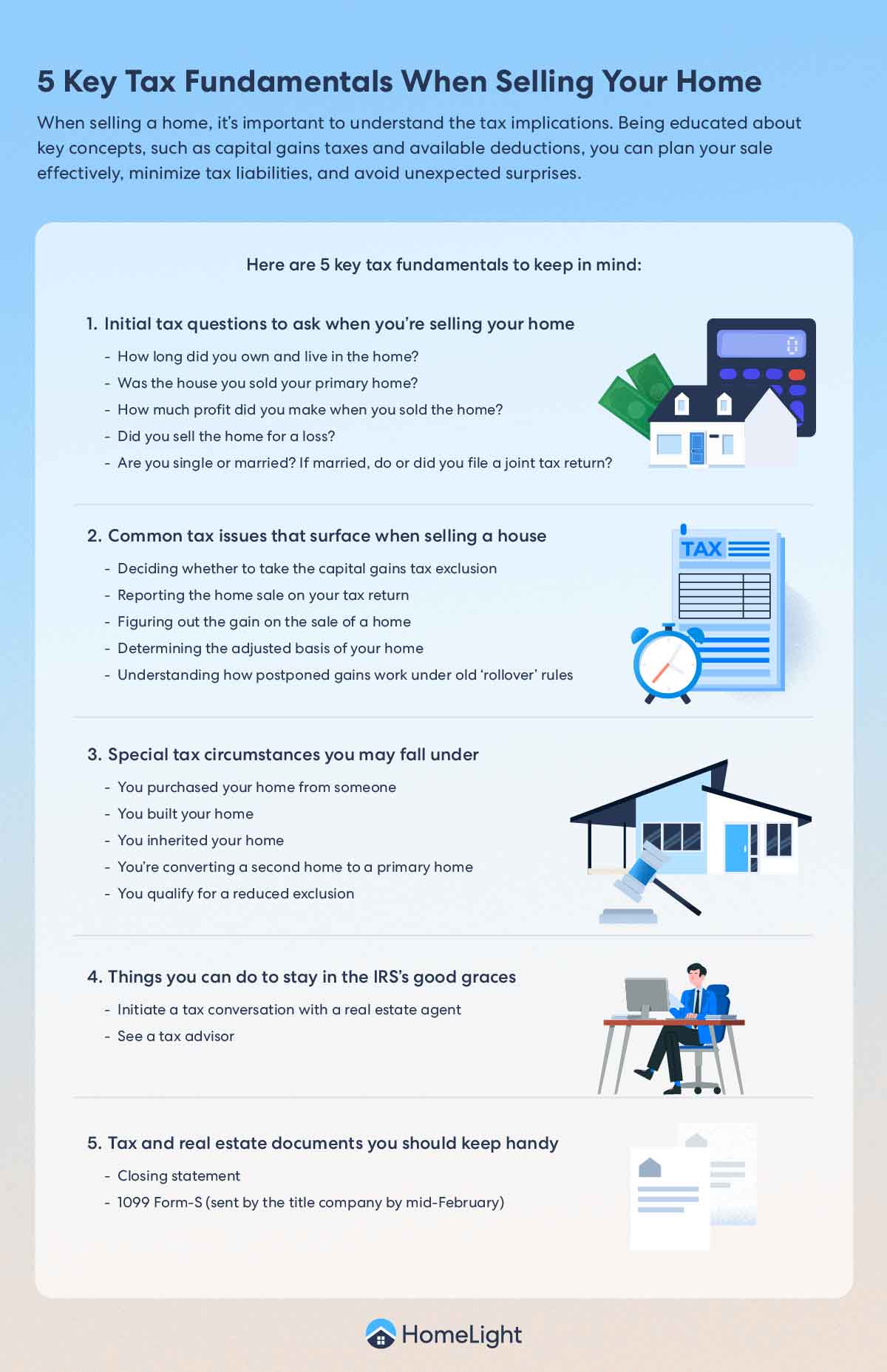Taxes on Selling Your House? Here’s a Plain-English Breakdown
- Published on
- 15 min read
-
Amanda Hanna, Contributing AuthorCloseAmanda Hanna Contributing Author
Amanda Hanna holds a master's degree in Writing and Publishing and a bachelor's degree in English and Creative Writing, both from DePaul University in Chicago. Her work has been featured in Crain's Chicago Business, Slag Glass City, LitCity312, and Prevail N Prosper.
-
Sam Dadofalza, Associate EditorCloseSam Dadofalza Associate Editor
Sam Dadofalza is an associate editor at HomeLight, where she crafts insightful stories to guide homebuyers and sellers through the intricacies of real estate transactions. She has previously contributed to digital marketing firms and online business publications, honing her skills in creating engaging and informative content.
Owning a house (or two, or three) is an exciting milestone in life and a quintessential symbol of the American Dream. But when it’s time to let go of the property, the process can be particularly daunting, especially as you face taxes on selling a house.
As if the process of selling a house wasn’t complicated enough, lo and behold, Uncle Sam decides to play a mean numerical trick on you when that dreaded tax season rolls around.
The last thing you want after popping the bubbly in celebration of your big home sale is a surprise letter from the Internal Revenue Service (IRS). Or worse yet, finding out after the chips fall that you missed out on big breaks.
But don’t worry, we’re here to help you understand the rules, regulations, and stipulations so you can feel more confident about the taxes you owe — or (better yet) don’t owe.
Understanding the capital gains tax break
Before we get into the nitty-gritty, know that in most cases, when you sell your home, you won’t even need to report the sale to the IRS. That’s because there’s a good chance the profit from your home sale is tax-free.
According to Section 121 exclusion from the IRS, you won’t need to pay taxes on up to $250,000 of your net profit, or up to $500,000 if filing jointly, as long as you owned and lived in the home as your primary residence for at least two of the past five years and haven’t used the exclusion on another home in the last two years.
You’ll need to report the sale of your primary home on Form 8949 if you’re a single filer with a home sale gain of more than $250,000 or a married couple filing jointly with a home sale gain of more than $500,0000.
In the same way, you must report it if you choose not to exclude your gain. For example, you intend to sell another primary residence with an even larger gain in the near future, or you received Form 1099-S, which is used to report real estate transaction proceeds to the IRS.
If you have a taxable gain due to high proceeds, or you don’t meet the three requirements listed above, you can expect to pay capital gains taxes in the year following your home sale. Tax brackets are based on your taxable income and filing status, and are separated into short-term capital gains and long-term capital gains.
Short-term capital gains apply if you owned the home for one year or less before selling. In this case, any profit is taxed as ordinary income, meaning it’s subject to your regular income tax rate, which ranges from 10% to 37%.
2026 short-term capital gains tax brackets
| Tax rate | Single filers | Married filing jointly | Head of household |
| 10% | $0 to $12,400 | $0 to $24,800 | $0 to $17,700 |
| 12% | $12,401 to $50,400 | $24,801 to $100,800 | $17,701 to $67,450 |
| 22% | $50,401 to $105,700 | $100,801 to $211,400 | $67,451 to $105,700 |
| 24% | $105,701 to $201,775 | $211,401 to $403,550 | $105,701 to $201,775 |
| 32% | $201,776 to $256,225 | $403,551 to $512,450 | $201,776 to $256,200 |
| 35% | $256,226 to $640,600 | $512,451 to $768,700 | $256,201 to $640,600 |
| 37% | $640,601 or more | $768,701 or more | $640,601 or more |
Long-term capital gains apply if you owned the home for more than one year. These gains are taxed at preferential rates, typically 0%, 15%, or 20%, depending on your overall taxable income.
2026 long-term capital gains tax brackets
| Tax rate | Single filers | Married filing jointly | Head of household |
| 0% | $0 to $49,450 | $0 to $98,900 | $0 to $66,200 |
| 15% | $49,451 to $545,500 | $98,901 to $613,700 | $66,201 to $579,600 |
| 20% | $545,501 or higher | $613,701 or higher | Over $579,600 |
“Right now, with the way the market is, at least here in Las Vegas, we’re seeing such a large increase in the past couple years of sellers making a significant profit on what they paid for the house, in comparison to what they sold it for,” says Craig Tann, a Las Vegas real estate agent with two decades of experience.
When it comes to taxes, Tann reveals the most common question he hears among savvy sellers before, during, and sometimes even after selling is: “Am I responsible for paying taxes on the sale of my home?”
“I like to address it upfront with them, if they may potentially be responsible for capital gains tax, and if they need to speak with their Certified Public Accountant (CPA) about what that looks like for them. I’d hate to have that question after closing, and then they find out they’re responsible for 20% in capital gains,” he says.
But once you have answered this question, what happens next? We examined some of the major tax implications when selling a house and spoke with Tann on his experiences working with homeowners.
This beginner’s guide will walk you through the basics of real estate taxes, no matter where you live in the U.S.
Getting started: 5 home sale tax fundamentals
Understanding the tax implications of selling a property is essential. By familiarizing yourself with key concepts, such as capital gains taxes and available deductions, you can plan your sale effectively, minimize tax liabilities, and avoid unexpected fees and penalties.
1. Initial tax questions to ask when you’re selling your home
- How long have you owned and lived in the home?
- Was the house you sold your primary home?
- How much profit did you make when you sold the home?
- Did you sell the home at a loss?
- Are you single or married? If married, did you or did you not file a joint tax return?
The answers to these questions will help you determine if you can take advantage of the capital gains tax exclusion. In particular, you’ll better understand:
- If you need to pay taxes on the profit you made from selling your house
- How you can qualify for the capital gains tax break
Depending on where you live or how much your house is worth, you most likely will not have to pay taxes on the profit you made selling your home, unless you made more than $250,000 on the sale (or $500,000 if you’re married and filing a joint tax return).
To qualify for the capital gains exclusion, you have to pass three “tests”:
- The ownership test: You must have owned the home for at least two years.
- The use test: You must have lived in the home for at least two full years (consecutive or non-consecutive years).
- The “other home” test: You did not exclude your profit from the sale of another home during the two-year period ending on the date of sale of this home. In other words, you can only exclude one home sale every two years.
However, Tann says even if you don’t meet all the requirements, you shouldn’t necessarily delay selling your house just because of the tax implications involved.
“If a seller has to move for [work] relocation purposes or because the payments are not affordable or they’re looking to upgrade, although the tax is relevant, it may be irrelevant to their situation,” Tann explains.
“They should have a conversation with the CPA, so they at least know what that looks like for them. And if it’s an investment property, then they may want to consider using a 1031 exchange.”
So, what’s a CPA, and how can you find one? The National Association of State Boards of Accountancy, which has been supporting the accounting profession for over a hundred years, says “a CPA license is a symbol to the public that an accountant has mastered the vital elements of the accounting profession.”
To find a CPA for help with your real estate tax questions and needs, you can start by browsing websites like CPAdirectory.
2. Common tax issues that surface when selling a house
Deciding whether to take the capital gains tax exclusion
If you happen to own more than one home (and lucky you!), you may want to think twice about claiming the exclusion if you plan to sell a home within two years of another sale. That allows you to “protect” or defer the exclusion for another house.
On the other hand, if you own multiple homes but don’t plan on selling another home within two years, you don’t have to worry about whether it’s in your best interest to claim the exclusion.
Reporting the home sale on my tax return
You need to report the sale of a home on your tax return if all or any part of the gain isn’t excluded. You must also report the sale if:
- You choose not to claim the exclusion OR
- You receive Form 1099-S (Proceeds from Real Estate Transactions)
Figuring out the gain on the sale of a home
Generally, when you sell your house for more than it cost, you guessed it, you have a gain! However, this number doesn’t tell you the original cost of your house, so for tax reasons, you must determine your adjusted basis to figure out whether you’ve gained or lost in the sale. Your accountant can help with this.
According to the IRS, your adjusted basis is “generally your cost in acquiring your home plus the cost of any capital improvements you made.”
As you might imagine, capital improvements increase your basis, or the amount of your capital investment in assets, like property, for tax purposes.
On the other side of the coin, if you experienced depreciation, casualty losses, or theft losses, you’ll need to adjust your basis down to account for any deductions you already took
We recommend reviewing page 6 of Publication 551, which provides examples of increases and decreases to basis, to help you figure out your adjusted basis.
In a nutshell, the core formula for adjusted basis is:
Adjusted basis = Original cost of asset + Improvements to asset
plus – Repair of damages to asset – Depreciation to asset – Deducted casualty loss to asset
From there, based on the resulting adjusted basis number, you can easily determine your gain number.
Determining the adjusted basis of your home
For tax purposes, once you’ve determined your cost basis, which is a combination of the amount you paid for your house, legal fees, utility connection charges, title fees, transfer taxes, and recording fees, among others, you will then adjust that numerical basis depending on your situation.
Remember, your property’s basis is not fixed. It evolves over time to accurately represent your investment. That’s why it’s called an adjusted basis. The starting basis can either be increased or decreased. Here’s a breakdown of both scenarios.
Common adjustments that increase cost basis:
- Major additions or improvements that increased your home’s value, prolonged its life, or gave it a new use
- Cost of extending utility service lines to your property
- Expenses from repairs after a casualty, including fires, earthquakes, hurricanes, and tornadoes
- Legal fees for defending and perfecting the title
- Impact fees and zoning costs
Because these adjustments increase your home’s cost basis, they can lower the profit of your home sale, and that can help reduce your capital gains taxes.
Common adjustments that decrease cost basis:
- Insured losses (in which case, you must deduct insurance proceeds from your basis since you added repair costs to your basis)
- Settlement fees or closing costs
- Money you received for doing things that reduce your property’s value (i.e., selling rights-of-way or easements)
- Anything you have already deducted elsewhere
Note: According to the IRS, if some or all of your property is used for business, an income-producing activity, or a home office, you should have claimed depreciation, “a tax deduction that allows a taxpayer to recover the cost or other basis of certain property,” against the business use of the property. If this applies to you, you’re required to subtract the depreciation deduction from your basis, whether or not you claimed it on your taxes.)
Consider if any of the above adjustments apply to you, and then add or subtract them from your home’s cost basis. This number is your adjusted basis.
Understanding how postponed gains work under old ‘rollover’ rules
Before May 6, 1997, if you sold your house and used the gain to buy a new one at an equal or greater price, you could postpone paying tax on that profit until whenever you sold that new house.
After May 6, 1997 — when President Bill Clinton abolished the rollover with the Taxpayer Relief Act of 1997 — through today, you can no longer defer paying taxes on your home sale gain by buying an equal-priced or more expensive home.
Instead, you now only have two options:
- Exclude your gain on the sale
- Report your gain on the sale as taxable income in the year sold
How to calculate capital gains tax
To recap some of the most common tax issues we discussed, let’s summarize how to calculate capital gains tax on selling your home:
1. Determine the adjusted cost basis: Start with the original purchase price of the home, add the cost of qualifying home improvements (e.g., a new roof, a remodeled kitchen, or a new central air conditioning), and subtract any depreciation claimed for tax purposes (like for a rental property). As mentioned, the adjusted cost basis formula is expressed as:
Adjusted Cost Basis = Purchase Price + Improvements – Depreciation (if applicable)
2. Calculate capital gains: Subtract selling expenses, such as real estate commissions and closing costs, and the adjusted cost basis from the final sale price of the home. The capital gains formula is expressed as:
Capital Gains = Sale Price – Selling Expenses – Adjusted Cost Basis
3. Apply IRS exclusions: Exclude up to $250,000 (single) or $500,000 (married filing jointly) if the home was your primary residence for at least two of the last five years and you meet eligibility requirements.
Example:
You bought a Craftsman home for a total price of $300,000 and spent $50,000 improving it. After five years, you sold it for $600,000, with $30,000 in selling expenses.
Adjusted basis = $300,000 + $50,000 = $350,000
Capital gains: $600,000 – $30,000 – $350,000 = $220,000
Since $220,000 is within the $250K exclusion, no tax is due for a single seller.
3. Special tax circumstances you may fall under
Your home’s original cost matters in tax discussions because it determines how much profit you show when you sell, and that affects the taxes you might owe. Homeowners usually fall into one of three groups: you bought your home, built it yourself, or inherited it. While the original cost is generally what you paid, it can change depending on how and when you got the house and who you paid.
Here’s a breakdown of some common scenarios:
You purchased your home from someone
This one might be obvious, but your home’s original cost is the price you paid for the house, including settlement or closing costs, your down payment, and any debt assumed.
You built your home
If you constructed your house or contracted to have it built on the land you own, the amount you paid, including the closing costs paid when you bought the land or settled on your mortgage, is the cost of your home.
The ‘basis’ also includes expenses on labor and materials, contractor fees, architect fees, building permit charges, utility meter and connection charges, and applicable legal fees.
Note that if you purchased or built a home, the IRS doesn’t allow you to include the sales taxes as part of your cost basis if you choose to deduct those taxes as itemized deductions on Schedule A (Form 1040).
You inherited your home
The cost basis on inherited assets, like property, is the fair market value of your home on the date of the previous owner’s death. But what exactly is fair market value? It’s the price an asset would command in the marketplace.
If you don’t sell the house within a year of inheritance, it’s recommended that you hire a professional certified appraiser to determine the fair market value asking price.
You’re converting a second home to a primary home
If you happen to own a second home, whether it’s a slopeside chalet in Colorado, a beach cottage in Cape Cod, or some other dreamy escape, it’s tricky to take advantage of the tax benefit that allows married homeowners to claim up to $500,000 of tax-free gains when they sell their primary house.
To claim the benefit, you need to live in the second home for at least two years.
You qualify for a reduced exclusion
If you don’t qualify for the capital gains tax exclusion, you may be eligible for a reduced exclusion. This applies if the living conditions of a qualified individual change. So, who’s considered a “qualified individual” in this scenario?
- You
- Your spouse
- A co-owner
- A resident
In most cases, you can qualify for and claim a reduced exclusion if you sold your house for any of the following reasons:
- You moved for a new job AND a) that new job is at least 50 miles farther from your new house than your previous job (or, if you didn’t have a previous employer, at least 50 miles farther from your previous home) and b) you changed your employment situation while you still owned and lived in the house.
- Your qualified family member — living in your house — has a disease, illness, or injury, and you have to sell your property to a) get them a diagnosis, a cure, mitigation, or treatment or b) because a doctor recommends a change of residence for medical or personal care reasons.
- You experience unforeseen personal, familial, or environmental circumstances such as:
- Death
- Divorce
- Eligibility for unemployment compensation
- Inability to pay for basic living expenses
- Employment changes
- Involuntary conversions, such as your house being destroyed, condemned, or under threat of condemnation
- Multiple births from the same pregnancy (twins or triplets)
- Natural or man-made disasters
4. Things you can do to stay in the IRS’s good graces
Initiate a tax conversation with a professional
If your real estate agent hasn’t brought up real estate taxes and what you might owe after closing on the sale of your house, it’s in your best interest to take charge and initiate that conversation with them. Ideally, you should speak with a CPA as well, so you don’t experience any surprises come tax season.
“I’ve heard stories from agents who didn’t have a conversation with the seller about their tax implications, and they missed a deadline by a week or two weeks or a month.
“Stories about how the seller didn’t have to specifically sell, and they could have waited another 30 days, but now there’s some sort of tax implication. Agents who didn’t advise the client, and who, unfortunately, sold and closed the house before a deadline,” Tann explains.
See a tax advisor
Tax rules and regulations are constantly changing from year to year, decade to decade, and even administration to administration. Tann advocates seeing a tax advisor when selling your home.
“There are so many factors that come into play that the agent should have some sort of basic knowledge [of real estate taxes]. But again, sellers want to go to a tax advisor to get proper advice on what the best course of action for them is.”
Tann explains the importance and sensitivity of the matter with the following example:
If a homeowner occupies a house, and they’re at the one-year and 10-month mark (and, thus, two months away from the two-year threshold described earlier), Tann says they want to do one of two things: either hold off on the two months or, if they put the house on the market, work the contract so that the closing takes place after the two-year deadline.
5. Tax and real estate documents you should keep handy
Closing statement
Though it’s uncommon for a real estate agent or broker, Tann says his team at Huntington & Ellis mails every client who sold or purchased a home in the previous year a copy of their closing statement by mid-January or February.
The closing statement includes a letter explaining why they need it and advising them to provide it to their CPA.
“We noticed — five or six years ago — that clients were calling, or their CPAs were calling, asking us for a copy of their closing statement. So we figured that instead of having them call us, we would initiate.”
If you happen to be working with an agent who doesn’t provide that service automatically, you can simply request the closing statement from the agent or the title company that closed out the sale of your house.
1099 Form-S
Form 1099-S (Proceeds From Real Estate Transactions) is necessary “to report the sale or exchange of real estate.” This form usually arrives directly from the title company in the mail by mid-February, so keep your eyes peeled for it then. As Tann explains, it will help you determine whether you have to pay taxes on the profit you made.
Big takeaways for taxes on selling your house
Selling your house while oblivious about your tax obligations is a fundamental no-no. For the sake of your wallet (and sanity), be familiar with the tax implications, including capital gains taxes, possible exclusions, and deductible expenses, to avoid costly surprises.
Be proactive throughout the year by making appointments with a tax advisor or CPA, starting tax conversations with your agent, and keeping receipts for all your property expenses, such as home improvements or remodeling. Bring these papers with your newfound tax background in tow so you can feel empowered when you file in the spring, no matter the outcome.
The tax implications of selling a house are relatively black-and-white, meaning you will or will not have to pay taxes on the profit you make after closing. However, the whole process can be incredibly confusing given the strict timeframes and thresholds the IRS enforces.
While top real estate agents should have a basic understanding of the financial implications of selling a home, you should bring up most of your tax questions and concerns with a tax advisor. Choose a professional who is equipped with the most up-to-date information for any given year, and who you trust to discuss your situation openly and freely.
And before you get too far into the process, use HomeLight’s free Home Value Estimator to get a data-backed estimate of what your home is worth and have a realistic forecast of your potential gains and tax obligations.
Header Image Source: (stevepb/ Pixabay)
Editor’s note: This blog post is for educational purposes only, not legal or tax advice. If you need help determining the taxes on your home sale, please consult a skilled tax professional.



















